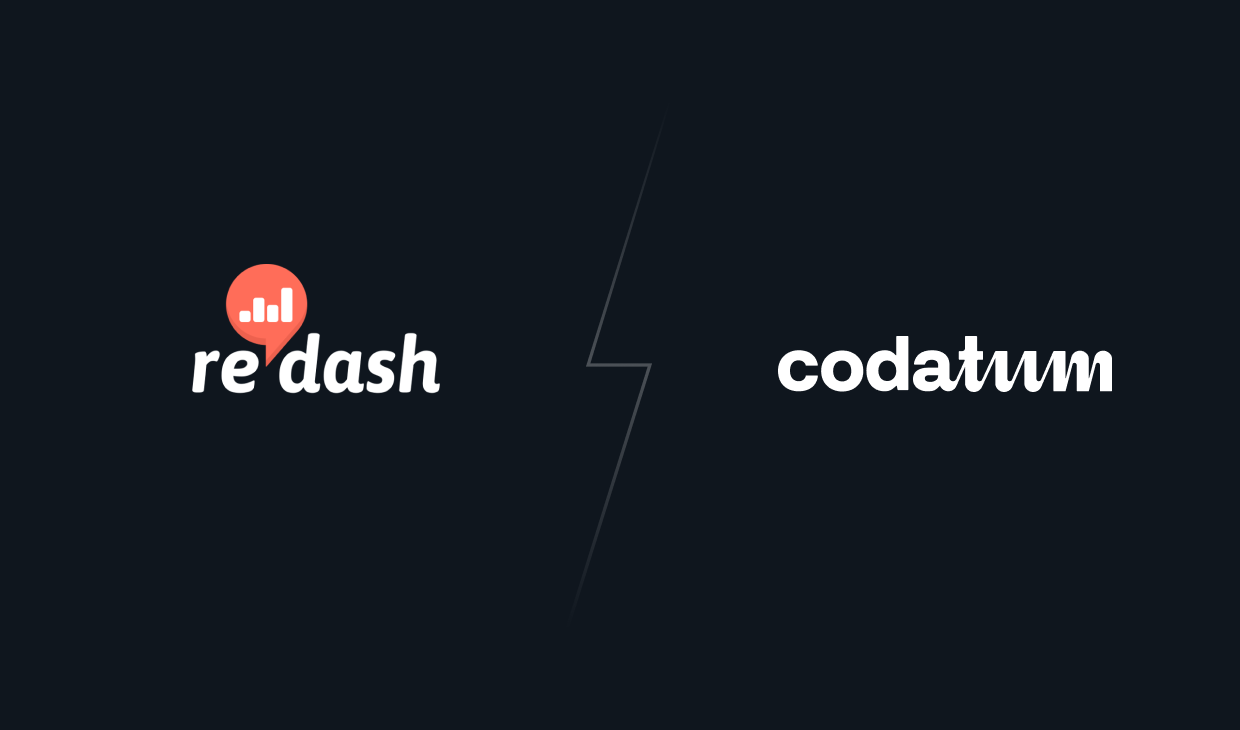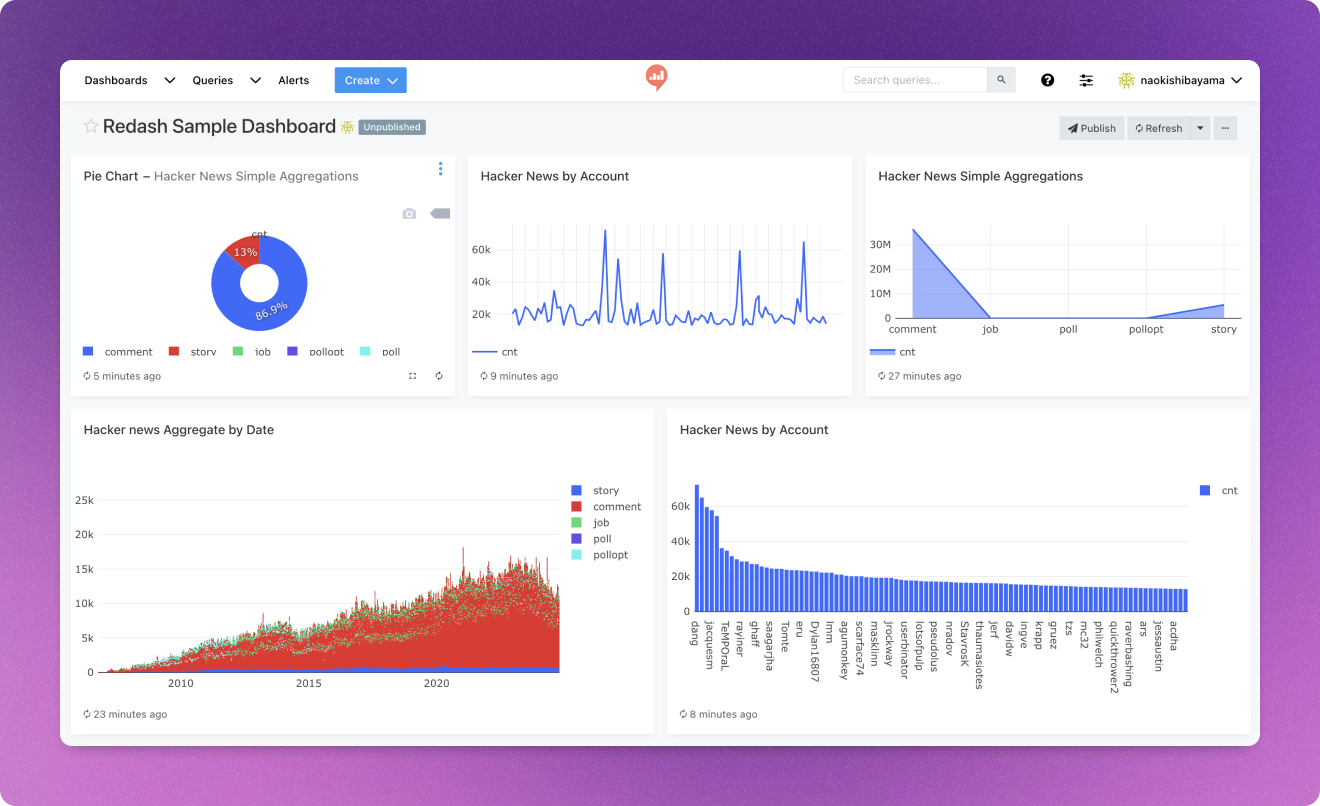
Contents
SQL-based data analysis has become essential in today's data-driven business environment. For data engineers and analysts, it's a crucial part of their daily work. For engineers managing large-scale SQL queries during incident response or application development, efficient SQL code management and sharing are equally important challenges.
In this article, we'll compare two SQL-based analysis and SQL code management tools: Redash, a long-standing solution supported for years, and Codatum, our new tool with advanced features. We'll explore their characteristics and ideal use cases in detail.
What is Redash?
Redash is an open-source data visualization and dashboard tool that has been beloved by many engineers and data analysts as a SQL-based data analysis/BI product. Unlike other BI tools, its GUI is optimized for SQL-based dashboard creation. While its primary purpose is charting, dashboards, and data analysis, it's also widely used as an SQL code management and sharing tool due to its ability to execute, save, and share SQL easily.
Acquired by Databricks in 2020, it's currently maintained by the community and serves as a cost-effective data analysis solution.

Redash's main advantages lie in its simplicity and support for diverse data sources:
Cost Efficiency
: Available for free as open-source software
Self-hosting
: Can be operated on your own servers
Multiple Data Sources
: Connects to various databases including Redshift, Snowflake, PostgreSQL, MySQL, and
Alert Feature
: Enables real-time monitoring of data changes
However, Redash has several challenges:
Limited Editor Features: Lacks
advanced suggestions
and
code splitting/reference
capabilities
Sharing and Permission Management: No guest sharing features or detailed permission management for datasets/dashboards
Update Delays:
Latest update was 5 years ago
, raising maintenance concerns
Feature Comparison
Let's compare the key features of both tools in detail:
Let's compare the key features of both tools in detail:
Feature | Codatum | Redash |
SQL Management/Editor | Advanced features | Basic features |
Dataset Search | 👌 | ❌ |
SQL Splitting/Reference | 👌 | ❌ |
Folder Management | 👌 | ❌ |
Dashboard | Full-featured | Simple |
Explorer Feature | 👌 | ❌ |
Notebook (Ad-hoc Analysis Reports) | 👌 | ❌ |
Sharing Features | Various sharing methods | Limited sharing methods |
External Guest Sharing | 👌 | ❌ |
Global Publish | 👌 | 👌 |
White Label Embed | 👌 | ❌ |
Supported Data Sources | BigQuery/Snowflake/Redshift/Databricks (Expansion Planned) | Multiple sources |
Permission Management | 👌 Detailed settings available | ❌ Limited |
Catalog Feature | 👌 | ❌ |
Alert Feature | ❌ | 👌 |
AI Assistant | 👌 | ❌ |
Delivery Method | SaaS | OSS, Self-Hosting |
SQL Management/Editor
Redash provides a basic SQL editor with minimal features. Codatum offers comprehensive support for efficient SQL development with:
Table information including columns
Fast dataset searching
SQL splitting/reference capabilities
Management of large amounts of SQL using folders and teamspaces
Notebook Feature
Codatum allows you to document your analysis process including SQL in notebook format, making ad-hoc analysis, iteration, and sharing easier. Redash doesn't have this feature.
Sharing and Permission Management
While Redash offers basic sharing capabilities, Codatum enables:
Secure sharing with external guests
Detailed permission settings
for resources
Team collaboration
features
AI Assistant
Codatum's AI Assistant provides:
SQL generation for users unfamiliar with SQL
Learning opportunities through AI interactions
Productivity enhancement for SQL experts
Complex query automation
When to Choose Which Tool?
Choose Redash When You:
Want to
minimize costs
: Available for free
Need
self-hosting
: Can be operated on your own servers
Handle
multiple data sources
: Analyze data across multiple databases
Choose Codatum When You Need:
Ad-hoc analysis/reports
: Quick query creation and data exploration with Notebook features
Large SQL code management
: Manage queries and notebooks using team spaces and folders
High productivity
: Improve analysis efficiency with modern UI and intuitive operations
Stakeholder sharing
: External guest sharing and detailed permission management
Enhanced analysis with AI
: Powerful SQL generation and modification
Latest features and support
: Access to latest features through active updates and SaaS delivery
Summary
The choice of data analysis tools varies significantly depending on organizational needs and goals. While Redash is useful as a simple, cost-effective solution, it has limitations when you need the latest features or detailed management. Codatum offers modern UI and advanced features for efficient and effective data analysis.Key considerations:
Self-hosting vs SaaS
: Security requirements and internal network management
Feature updates
: Continuous access to latest features and security updates
Team collaboration needs
: Sharing and permission management requirements
If you're looking to create new value from data and enhance business competitiveness, consider trying Codatum. With the latest technology and user experience, it can greatly expand your data analysis possibilities.